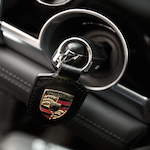 While vehicle theft is on the decline in South Australia, concerning new statistics reveal that thieves are now breaking into houses purely to steal the home owner’s car keys.
While vehicle theft is on the decline in South Australia, concerning new statistics reveal that thieves are now breaking into houses purely to steal the home owner’s car keys.
RAA Senior Manager Mobility & Automotive Policy, Mark Borlace said home break-ins linked to vehicle theft have increased, with as many as four in 10 cars now being stolen in conjunction with a residential burglary where car keys are taken.
“Due to immobilisers making it harder to steal a car, thieves are now using different methods as vehicle keys are the only property stolen in one in four house break-ins,” said Mr Borlace.
“A very high percentage of cars taken in this way are also recovered which means the theft is for short term use, and the cars tend to be newer and of higher value than cars taken from the street.
“These types of offenders are also becoming more brazen, entering premises they know are occupied and they are prepared to resort to or threaten violence to intimidate anyone at home.”
While these statistics are concerning, there are a number of things home occupants can do to minimise their risk, including keeping their car keys in a safe, untraditional place.
“While the majority of us leave our car keys in a spot near the front door where they’re easy to grab as we’re walking out the door – you’re also making it really easy for thieves to steal them quickly,” said Mr Borlace.
“And if you have a garage, then it’s definitely worth parking your car in there so it’s not visible from the street.”
In around half of these types of burglaries, someone was home at the time of the intrusion but wasn’t aware that it was happening at the time. Even if you are aware of an intruder, RAA warns against confronting them.
RAA Senior Manager Secure Services, Ben Nottage said in our recent security survey we discovered that over 40 per cent of respondents would investigate a strange noise in their home and over 20 per cent would actually confront an intruder.
“The safety of yourself and your family is much more important than possessions or your car, so I urge people to think twice about confronting intruders because you can’t be sure how many there are or if they’re armed,” said Mr Nottage.
“If you do happen to investigate a noise and discover an intruder, get out of their way and don’t try to block exits or trap them inside because you’re putting yourself at a huge risk and intruders are more likely to resort to violence if they are cornered.
“By creating a noise, phoning police and noting a description of intruders or vehicles, you can still be of assistance without being physically involved.”




















